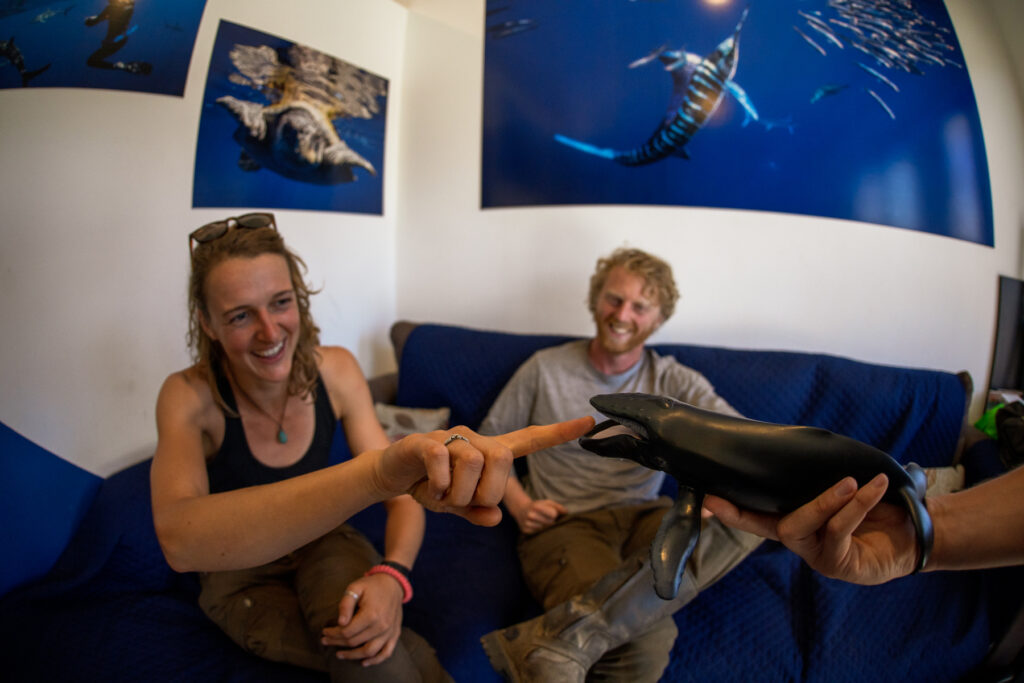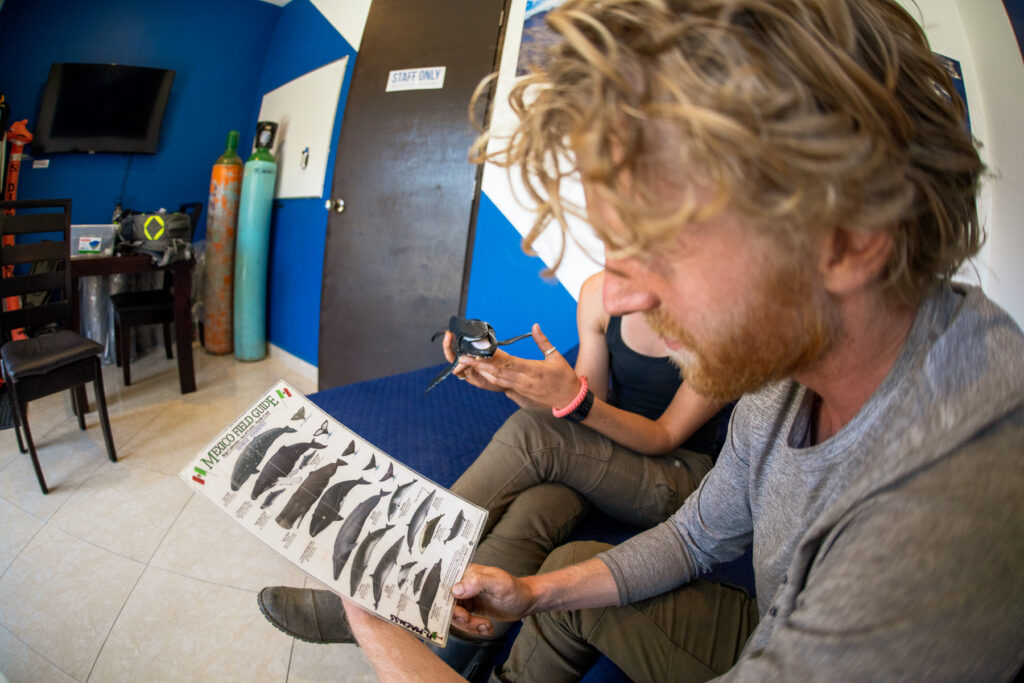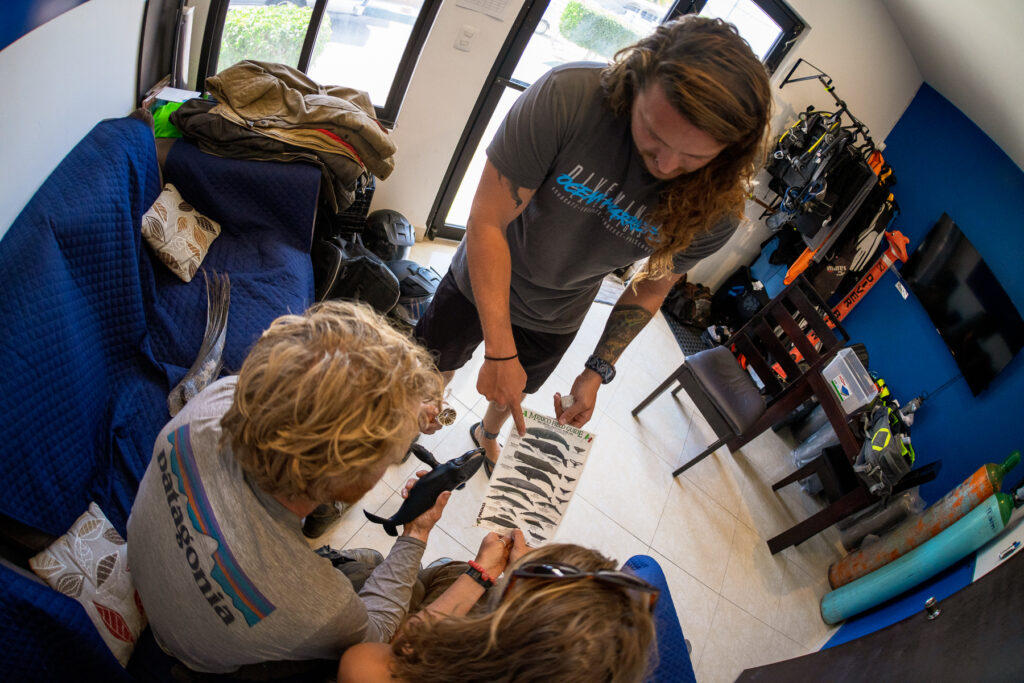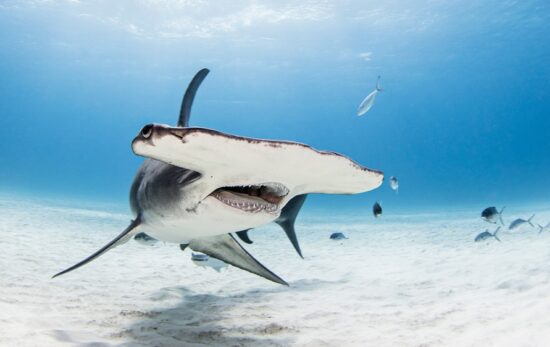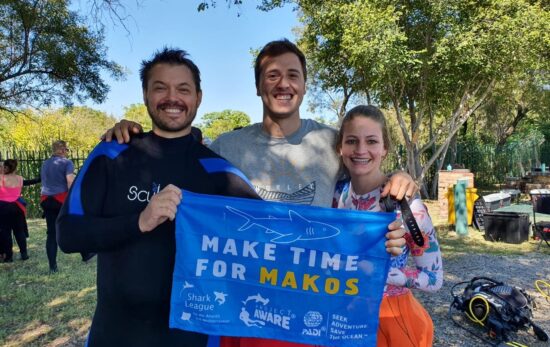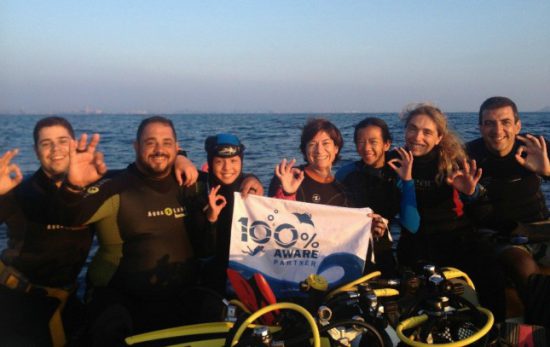“From the largest animal to have ever lived on earth, to their hauntingly beautiful songs, incredible migrations, playful calfs, and stories of them going out of their way to protect other species from harm. Our mammalian ocean cousins need our help.”
– Dive Ninjas, Whale Defender PADI Distinctive Specialty
Many of us have spent numerous hours over the past year dreaming about whale encounters while stuck in lockdown. So, when we caught wind of a PADI Master Instructor in Mexico who had spent the year creating the Whale Defender PADI Distinctive Specialty Course, we had to know more.
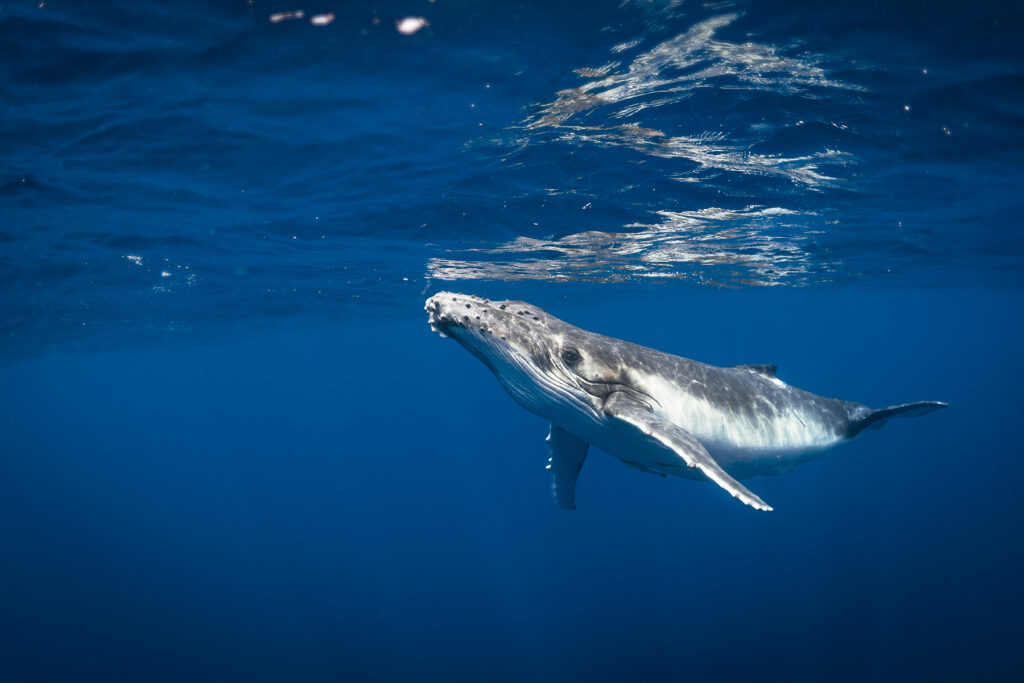
Digging for details led me to Jay Clue, a PADI Master Instructor, Tec Trimix Instructor and Founder of 100% AWARE Dive Ninja Expeditions in Cabos San Lucas. Here’s what he told me about the specialty, his ever-evolving relationship with the ocean and his hopes for the future of the marine tourism industry:
Hi Jay! So tell us, how did you first get into diving?
How I got into diving is a bit of a long story, but I think it really highlights how a passionate dive instructor can completely change someone’s life.
I first tried scuba diving in St Lucia around 2006 through a DSD style experience at the hotel I was staying at and it was, well, horrible. Later when I became an Instructor I realized that the shop had violated pretty much every basic standard for a DSD experience. From having one instructor for almost 20 DSD students, to non-existent safety protocols or even teaching how the equipment works. My primary memory from the day was thinking “Wow, that’s a pretty fish” while at the same time thinking “I’m going to die!”. The experience pushed me away from ever wanting to do anything in the ocean again. I didn’t even want to swim or snorkel after that.
Fast forward a few years ahead. While in Lanzarote I met a PADI Instructor that I would randomly exchange greetings with every morning on my walk into town. He would joke with me saying I should try diving and I would be like “You’re out of your mind”. One morning we chatted a bit about what had happened in St Lucia and some how he convinced me to try diving again. That course with him would turn my insane fear into a crazy love for the ocean. His patience as an instructor and passion for the ocean completely changed my viewpoints on so many different levels.
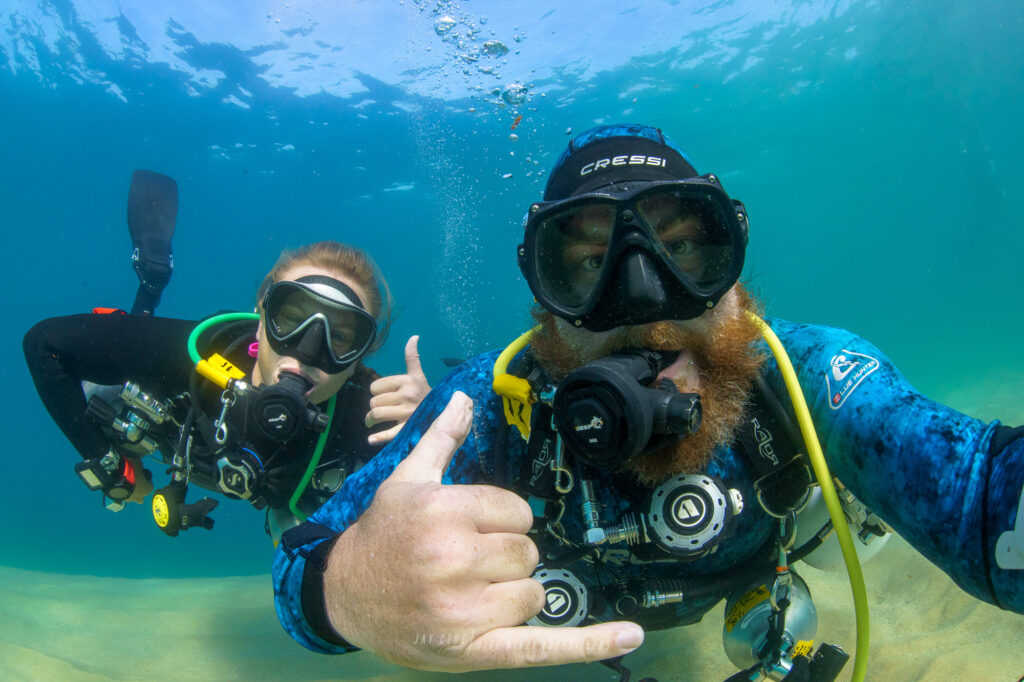
I would go on to finish my Open Water certification then dive non-stop for the rest of the trip. I was hooked. When I got back to London I linked up with an awesome shop that had a team of some really incredible humans and started UK diving pretty much every chance I could. I did around 300 dives in just the first year after getting certified. I was addicted. But the reality is that if it wasn’t for these incredibly passionate instructors in both Lanzarote and London, I probably would have never ended up the person I am now.
I like to tell this story to my Divemaster and Instructor students to try to show them how much impact they can have on their students and why it’s so important to bring their best to work everyday and why our focus as dive pros should not just be to teach, but to also inspire our students.
What a powerful story. It just shows the huge impact a dive professional can have on another life! What has your diving experience been since then?
Experience wise, I’ve worked in all sorts of conditions. From freezing cold, 0 viz UK diving to beautiful warm water reefs, to deep wrecks, cave diving, tec diving, exploration (ocean & cave), offshore/blue water diving, working with apex predators, research projects, conservation projects, developing logistics for documentaries etc… I’ve taught all levels of diving from Discover Scuba Diving through to Instructor, MSDT, and Trimix diving. These days I primarily teach sidemount, technical diving, conservation courses, and underwater photography while also mentoring our Divemaster and Instructor students at Dive Ninjas. Outside of teaching my primary duties are designing new expeditions and experiences for our guests as well as developing partnerships for new conservation and research projects.
Why is saving the ocean important to you?
Our planet’s oceans are critical for not only our existence but pretty much all life on earth. More than 50% of the oxygen we breath is produced in the ocean and they are home to upwards of 80% of all life on earth. They absorb 25% of all the carbon dioxide humans create and store 90% of the additional heat caused by global warming. It’s quite simple, without healthy oceans we humans no longer exist.
But beyond this there is so much more we are still discovering about the oceans every day. Over 10,000 compounds have been extracted from marine environments which play critical roles in medications, treatments, and biomedical research – and it’s estimated that up to 90% of species in the ocean are still awaiting discovery. That is mind blowing to me, yet the Marine Protection Atlas shows less than 7% of our world’s oceans are protected, and only 2.7% are highly protected. How can something so valuable to our existence have such a small level of protection? It’s mind boggling.
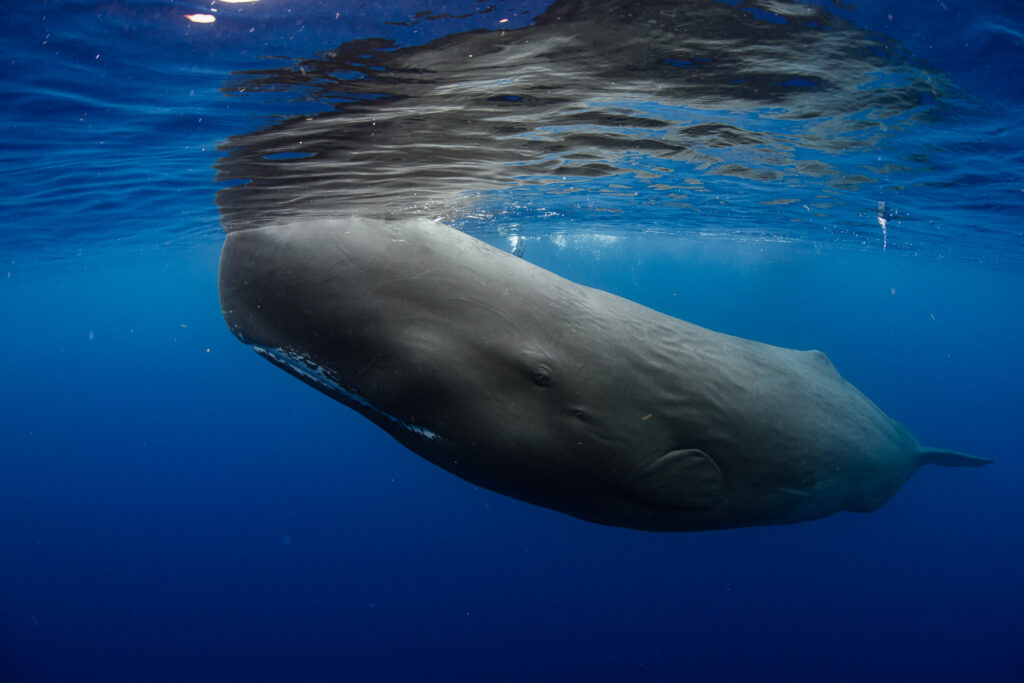
Which area of marine conservation are you most passionate about?
It’s really hard for me to narrow down just one. I’m very passionate about utilizing photography as a way to show people how remarkable our oceans are and why they should want to fight to protect them. But my passions span across multiple arenas of marine conservation including sharks, rays, whales, and sea turtles; as well as human impacts on the oceans and their inhabitants such as overfishing and marine debris. With Dive Ninja Expeditions my focus is centered around ecotourism and environmental education. I find the sustainable and eco tourism approach to conservation very interesting and believe it’s a very viable way to inspire more people to take action.
For example, it’s estimated global coral reef tourism alone generates upwards of $36 billion USD annually – and that is an ecosystem that makes up less than 1% of the ocean floor. Imagine if we could find a way to tap into even a small fraction of this revenue to further marine research and conservation efforts? This is just one of the ideas that we are trying to set as an example with Dive Ninjas by showing that a business could easily donate a portion of their revenue to help fund the protection of the marine life and ecosystems that make our tours and experiences possible. With some of our projects we are donating up to 50% of profits to local research and conservation organizations in hopes that others will see what is possible and begin creating their own programs to do the same in their area. This way not only are you teaching your guests or students about the ocean and how they can get involved in protecting it, but also directly creating positive impacts on local ecosystems and furthering marine research.
How would you describe Dive Ninja’s attitude to marine conservation?
Marine conservation and research is the heart and soul of Dive Ninja Expeditions. It is not just something our entire team is very passionate about, but actually intertwined into everything we do. Our vision from the start was to create a platform that could work to bridge the gaps between tourism, science, and conservation – and now four years later this still continues to be our primary focus and what keeps us pushing forward. I wanted to try to create something different – basically a way that tourism could be utilized to protect the remarkable creatures that drive so many of us to the ocean every day.
You can find more info about our conservation efforts here: https://www.diveninjaexpeditions.com/marine-conservation-ecotourism/
What lead you to create the Whale Defender Speciality Course?
I was working on a project with Sea Shepherd and marine mammal scientists Mario A. Escalara and Maria Laura Marcias looking at potential ways to better protect the humpback whale population that visits Cabo San Lucas every winter. One of the projects we designed was a whale watching ecotourism experience that aimed to turn the guests into citizen scientists as well as environmental watchdogs for a day.
Essentially, the guests would learn from local marine mammal scientists as well as to look out for, and help document, bad practices and threats to whales they see during the tour. The Whale Defender course was born out of this program. We had a few guests asking how they could learn more about whale conservation and realized the there wasn’t any type of similar course available. We weren’t really sure how to even approach the idea, but after an inspiring talk with Jack Fishman at PADI AWARE Foundation I had a clear idea of not only how to do it, but what we wanted to achieve with it. So Mario, Maria, and myself got to work writing & designing the Whale Defender course.
The concept of PADI Distinctive Specialties has really opened up a new opportunity for us to further extend our reach and inspire even more divers to get involved in protecting our ocean planet. I’m currently working on two more conservation focused distinctive specialties with some really incredible and passionate humans, such as Dr Frida Lara, Liz Parkinson, Marta Palacios and Ellen Myers. One course is about Apex Predators and the other is on Mobula Ray conservation.
Amazing! So what does the course actually entail? Do you get out on the water to see the whales? Are there any pre-requisites?
The course explores the complex intertwined history of humans and whales, as well as why whales are important for healthy oceans, the threats they are currently facing – like fishing gear entanglement and boat strikes from unregulated tourism – and how you can help protect these incredible ocean giants. You’ll learn about whale biology and evolution as well as citizen science projects you can get involved in right now. The course is a half day and 100% of the profits help fund better marine park enforcement and localized whale conservation efforts.
If guests are in Los Cabos during the whale season (December to April) they can receive a special package that includes the course and whale watching. Or the course can also be added on to our Gentle Giants Expeditions to see some of the other incredible titans of the sea that visit the waters around Baja California Sur. To book the course or combined educational expedition, book here or contact Dive Ninjas.
If you could ask the Torchbearer community to take one action, what would it be?
I would tell them to take a second to remember what first captivated them about the ocean and ignited that spark of wonder and love inside them. Hold that memory for a moment and remember what it felt like. Now, go take one step right now to protect that animal or ecosystem that made it possible. It doesn’t matter how big or small, what matters is that you take that first step and begin protecting what you love so that many more generations can experience that same feeling you feel right now.

